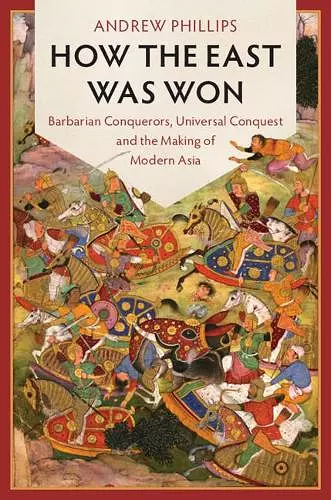How the East Was Won
Barbarian Conquerors, Universal Conquest and the Making of Modern Asia
Format:Paperback
Publisher:Cambridge University Press
Published:14th Oct '21
Currently unavailable, and unfortunately no date known when it will be back
This paperback is available in another edition too:
- Hardback£95.00(9781107120976)

The epic story of how Mughal, Manchu and English East India Company 'barbarians' laid the foundations for today's Asian superpowers.
Phillips reveals how Mughal, Manchu and Western imperialists developed common strategies of 'define and conquer' and 'define and rule' to subjugate South and East Asia. Examining how they leveraged cultural difference to pursue universal conquest, this book exposes the vital role 'barbarian' conquerors played in forging today's Asian superpowers.How did upstart outsiders forge vast new empires in early modern Asia, laying the foundations for today's modern mega-states of India and China? In How the East Was Won, Andrew Phillips reveals the crucial parallels uniting the Mughal Empire, the Qing Dynasty and the British Raj. Vastly outnumbered and stigmatised as parvenus, the Mughals and Manchus pioneered similar strategies of cultural statecraft, first to build the multicultural coalitions necessary for conquest, and then to bind the indigenous collaborators needed to subsequently uphold imperial rule. The English East India Company later adapted the same 'define and conquer' and 'define and rule' strategies to carve out the West's biggest colonial empire in Asia. Refuting existing accounts of the 'rise of the West', this book foregrounds the profoundly imitative rather than innovative character of Western colonialism to advance a new explanation of how universal empires arise and endure.
'Andrew Phillips has done it again - this book will completely change how you think about empires, as well the competition between the East and the West.' Ayşe Zarakol, Reader in International Relations, University of Cambridge
'How the East was Won brilliantly shows how peripheral groups overcame more powerful polities to create universal empires. Andrew Phillips demonstrates how these groups created such empires not by assimilating subject peoples but by a strategic process of cultural differentiation. They established diversity regimes that maintained the unique identity of the dominant elite, while simultaneously yoking culturally diverse indigenous elites to the conquest elite. In comparing the British Raj to Manchu and Mughal rule, he challenges the preconception that Western colonial empires differed fundamentally from the Asian empires. Instead of displacing indigenous practices, the British layered on to existing practices. Rather than see the current international order, as propelled by “the Rise of the West,” we might thus conclude that order has been infused with the hybridization of West and East from its infancy.' Hendrik Spruyt, Norman Dwight Harris Professor of International Relations, Northwestern University, Illinois
'A sweeping and beautifully-written explanation of how the Mughals, Manchus and British created vast and powerful empires and left lasting legacies for world order. This book is a definitive contribution to the creation of modernity and the study of global historical International relations.' Amitav Acharya, American University, Washington DC, and co-author (with Barry Buzan) of The Making of Global International Relations (Cambridge University Press, 2019)
'In this magnificent book Andrew Phillips takes us on a fascinating and deeply insightful journey beyond IR's Eurocentric frontier to challenge many of the continuing theoretical/conceptual assumptions of the discipline. He reveals the near-ubiquity of hierarchical Asian empires in the early modern period and how these shared many similarities in their origins and modalities of rule with the British empire as well as how international politics was forged through the interweaving of Western and Asian agency.' John M. Hobson,, Professor of Politics and International Relations, University of Sheffield, UK
'Phillips' masterful book on the Mughal Empire (c.1526-1858), the Qing Empire (c.1644-1912), and the British Raj (c.1765-1947) ambitiously challenges the received wisdom about early modern Asia. The author highlights that the West was initially backward so that Western colonialism could succeed only because it was built on Asian precedents of imperial emergence, expansion and consolidation. The winning formula was a 'define-and-conquer' and 'define-and-rule' strategy that curated identities to facilitate cultural appropriation and local collaboration. The resulting mega-states of 'India' and 'China' are modern inventions rather than the manifest destiny of supposedly unified and ancient civilizations. This book is a must read for students of international relations, comparative history, East Asia, India and China.' Victoria Tin-bor Hui, Associate Professor, Department of Political Science, University of Notre Dame
'A provocative read … Highly recommended.' Q. E. Wang, Choice Connect
'How the East Was Won presents a novel theory on the origins and governance of empires, focusing on the nexus between cultural variety and international order. … Through the use of three significant imperial international regimes in Asian history, this study advances our understanding of the mechanisms of hierarchy in global politics.' Zheng Chen, China International Strategy Review
ISBN: 9781107546714
Dimensions: 230mm x 152mm x 20mm
Weight: 530g
300 pages